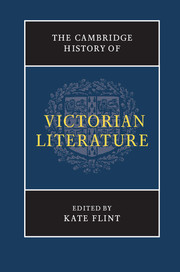Book contents
- Frontmatter
- Introduction
- PART I AUTHORS, READERS, AND PUBLISHERS
- PART II WRITING VICTORIA’s ENGLAND
- PART III MODES OF WRITING
- 7 Lyric and the lyrical
- 8 Epic
- 9 Melodrama
- 10 Sensation
- 11 Autobiography
- 12 Comic and satirical
- 13 Innovation and experiment
- 14 Writing for children
- PART IV MATTERS OF DEBATE
- PART V SPACES OF WRITING
- PART VI VICTORIAN AFTERLIVES
- Select bibliography
- Index
11 - Autobiography
from PART III - MODES OF WRITING
Published online by Cambridge University Press: 28 March 2012
- Frontmatter
- Introduction
- PART I AUTHORS, READERS, AND PUBLISHERS
- PART II WRITING VICTORIA’s ENGLAND
- PART III MODES OF WRITING
- 7 Lyric and the lyrical
- 8 Epic
- 9 Melodrama
- 10 Sensation
- 11 Autobiography
- 12 Comic and satirical
- 13 Innovation and experiment
- 14 Writing for children
- PART IV MATTERS OF DEBATE
- PART V SPACES OF WRITING
- PART VI VICTORIAN AFTERLIVES
- Select bibliography
- Index
Summary
In Sartor Resartus, as Carlyle reconstructs the auto/biography of Diogenes Teufelsdröckh from the scraps and fragments of his subject’s life, he pauses to wonder at ‘these autobiographical times of ours’. The phrase captures the expressivist turn of the early Victorian era and the explosion of writing in an autobiographical mode. As a word, ‘autobiography’ was virtually a neologism when Sartor Resartus was published in Fraser’s Magazine in 1833–4. In 1797 it had appeared (negatively) in the Monthly Review as a ‘pedantic’ term; it reappeared (positively) in 1809 in the Quarterly Review when Robert Southey praised the life of the Portuguese painter Francisco Vieira as a ‘very amusing and unique specimen of autobiography’. By 1826 the publishers John Hunt and Cowden Clarke had launched a popular series, Autobiography: A Collection of the Most Instructive and Amusing Lives Ever Published, Written by the Parties Themselves, and by 1828 Carlyle was musing, ‘What would we give for such an Autobiography of Shakspeare.’ The increasingly frequent use of the word ‘autobiography’ in the Victorian period is matched by the increasing number of periodical articles and reviews on the subject: 34 in the 1820s, 127 in the 1840s, 304 in the 1860s, and 433 in the first decade of the twentieth century, according to the Periodicals Index Online. Indeed, from the French perspective, even in 1866 ‘autobiography’ was an English invention, ‘still rare in France but conspicuously common across the Channel’.
- Type
- Chapter
- Information
- The Cambridge History of Victorian Literature , pp. 243 - 264Publisher: Cambridge University PressPrint publication year: 2012

